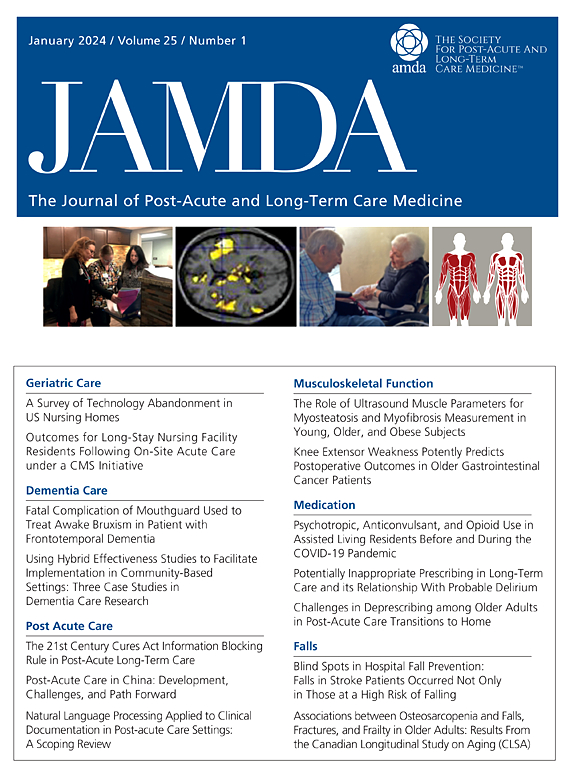居住在住宿照护机构的长者吸烟的共同决策:照护专业人士的观点。
IF 4.2
2区 医学
Q2 GERIATRICS & GERONTOLOGY
Journal of the American Medical Directors Association
Pub Date : 2025-02-01
DOI:10.1016/j.jamda.2024.105466
引用次数: 0
摘要
目的:有身体或认知障碍的老年人可能需要转移到住宿护理机构(rcf)。一些老年人吸烟,并依赖他们的护理专业人员继续吸烟。护理专业人员需要平衡个体居民的生活质量和福祉与所有居民和工作人员的健康和安全。共同决策(SDM)可以在这些困境中支持护理专业人员。本研究评估了可能影响居民烟草使用的医护人员行为和SDM程度的多种因素。设计:我们进行了定量的横断面研究。环境和参与者:我们包括在荷兰rcf的老年精神科和躯体科工作的护理专业人员。方法:采用在线问卷或纸质问卷收集资料,采用SPSS统计软件进行t检验和回归分析。结果:医护人员对居民烟草使用的积极态度与居民对烟草使用的SDM程度较低、使居民更经常吸烟显著相关。居民烟草使用SDM程度与限制居民烟草使用和以人为本的护理程度呈显著正相关。与在老年精神科工作的医护人员相比,在躯体科工作的医护人员报告的关于居民烟草使用的SDM程度显著更高。结论和启示:居民吸烟意愿在rcf中是一个复杂的问题。护理专业人员的态度导致其行为与SDM程度的不一致。此外,当护理专业人员需要限制居民使用SDM,而不能满足居民吸烟等不健康习惯时,他们更倾向于使用SDM。SDM可以通过将居民纳入决策,无论结果如何,支持护理专业人员处理有关居民烟草使用的困境。然而,多种因素影响护理人员的行为和SDM程度。特别是,他们的态度需要改变。SDM因国家法令和组织政策而进一步复杂化。本文章由计算机程序翻译,如有差异,请以英文原文为准。
Shared Decision-Making on Tobacco Smoking by Older Adults Living in Residential Care Facilities: Care Professionals’ Perspectives
Objectives
Older adults with physical or cognitive disabilities may need to move to residential care facilities (RCFs). Some older adults smoke tobacco and become dependent on their care professionals to continue smoking. Care professionals need to balance an individual resident’s quality of life and well-being with the health and safety of all residents and staff. Shared decision-making (SDM) could support care professionals in these dilemmas. This study assesses multiple factors that could affect care professionals’ behavior and degree of SDM regarding residents’ tobacco use.
Design
We conducted quantitative cross-sectional research.
Setting and Participants
We included care professionals working in psychogeriatric and somatic units in Dutch RCFs.
Methods
Data were collected with an online or hard copy survey and analyzed with t-tests and regression analyses using SPSS.
Results
Care professionals’ positive attitudes toward residents’ tobacco use are significantly associated with a lower degree of SDM concerning this use and enabling residents to smoke more often. The degree of SDM regarding residents’ tobacco use is significantly positively associated with limiting residents’ tobacco use and the degree of person-centered care (PCC). Care professionals working in somatic units report a significantly higher degree of SDM regarding residents’ tobacco use compared with those working in psychogeriatric units.
Conclusions and Implications
Residents’ wish to smoke tobacco is a complex matter within RCFs. Care professionals’ attitudes cause inconsistencies in their behavior and the degree of SDM. Moreover, care professionals tend to use SDM more often when they need to limit residents’ use and cannot fulfill residents’ unhealthy habits, such as smoking tobacco. SDM could support care professionals to deal with dilemmas regarding residents’ tobacco use by including residents in decisions, regardless of the outcome. However, multiple factors affect care professionals’ behavior and the degree of SDM. Especially, their attitudes need to be addressed. SDM is further complicated by national acts and organizational policies.
求助全文
通过发布文献求助,成功后即可免费获取论文全文。
去求助
来源期刊
CiteScore
11.10
自引率
6.60%
发文量
472
审稿时长
44 days
期刊介绍:
JAMDA, the official journal of AMDA - The Society for Post-Acute and Long-Term Care Medicine, is a leading peer-reviewed publication that offers practical information and research geared towards healthcare professionals in the post-acute and long-term care fields. It is also a valuable resource for policy-makers, organizational leaders, educators, and advocates.
The journal provides essential information for various healthcare professionals such as medical directors, attending physicians, nurses, consultant pharmacists, geriatric psychiatrists, nurse practitioners, physician assistants, physical and occupational therapists, social workers, and others involved in providing, overseeing, and promoting quality

 求助内容:
求助内容: 应助结果提醒方式:
应助结果提醒方式:


